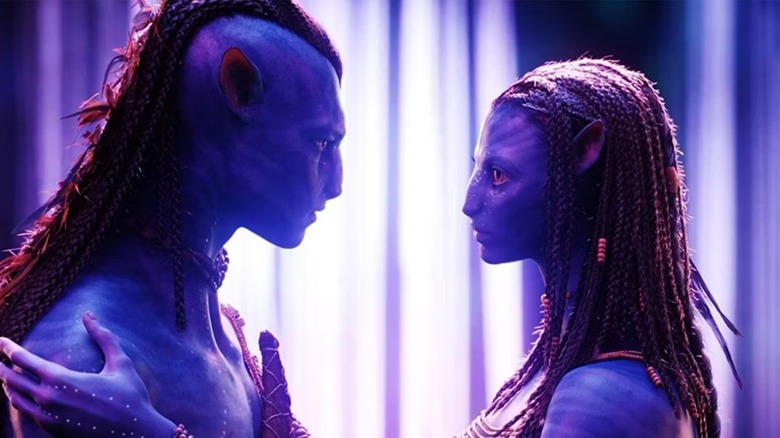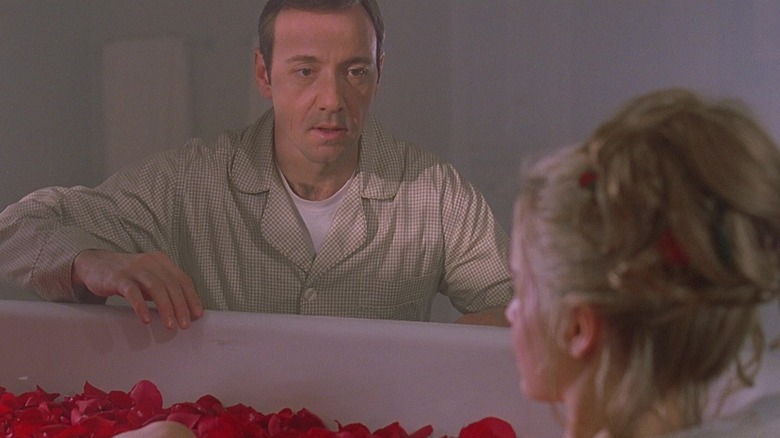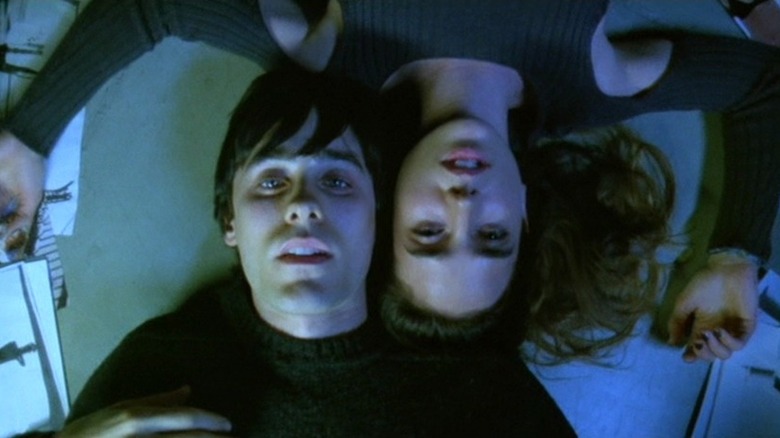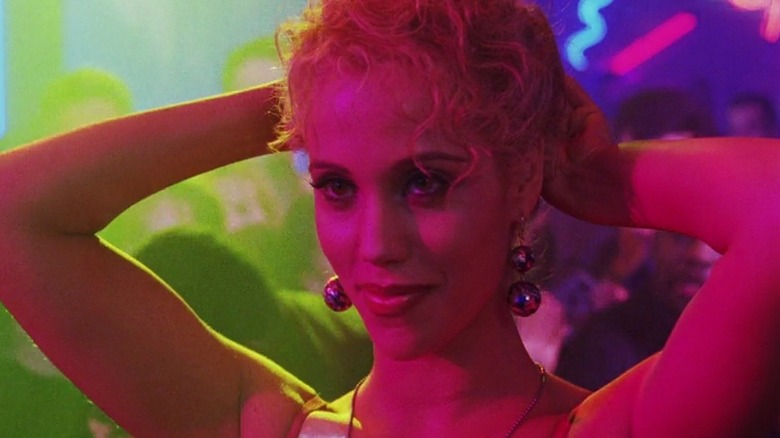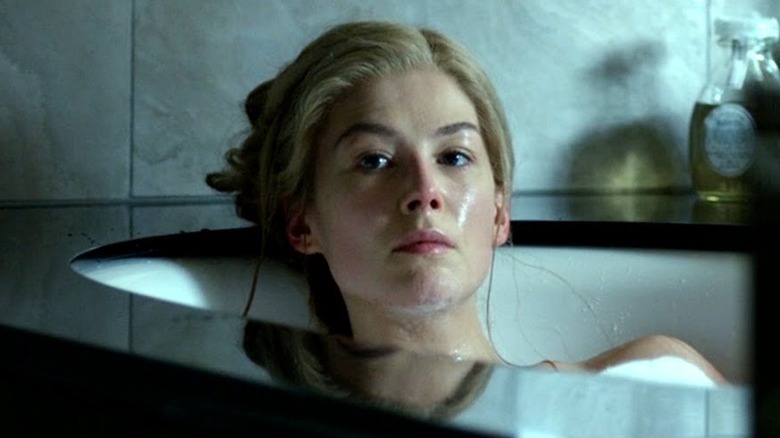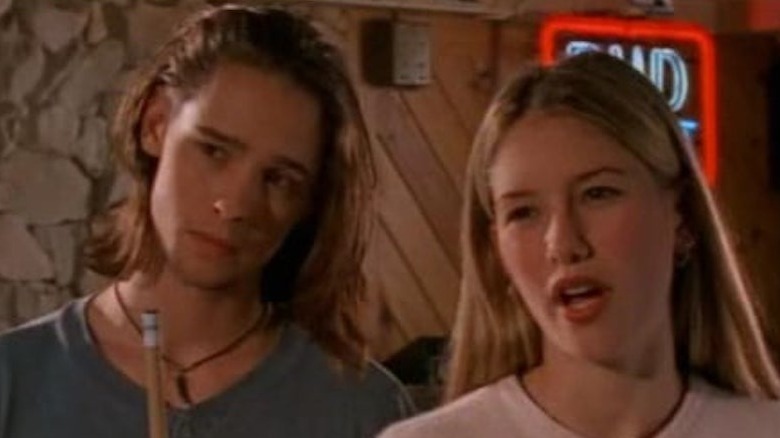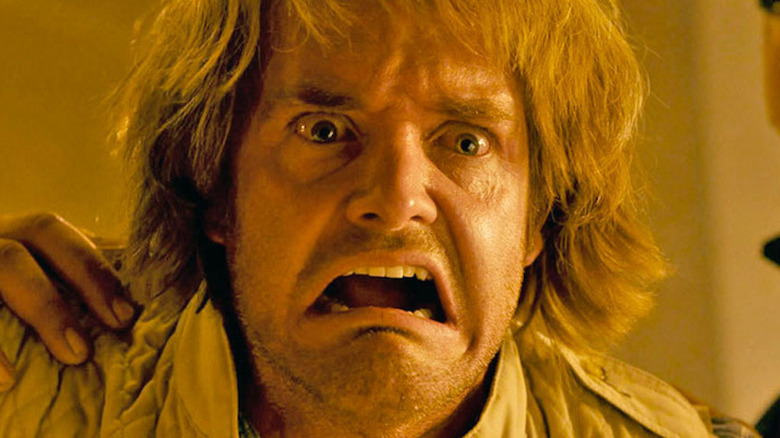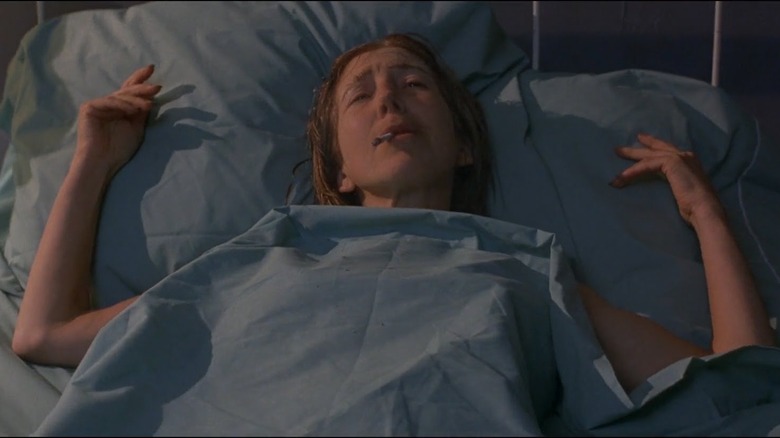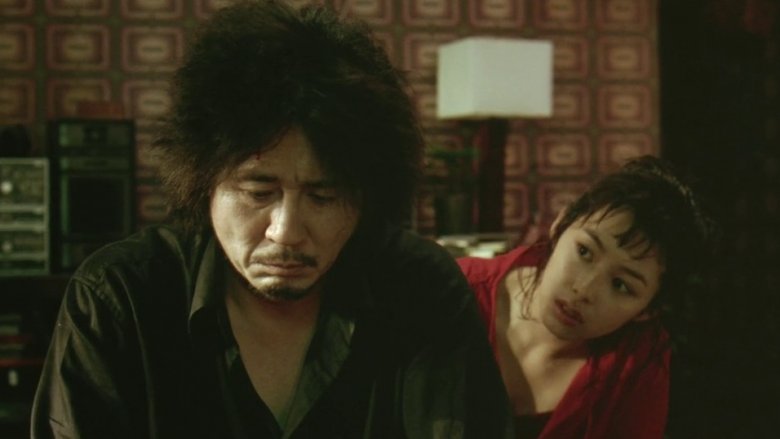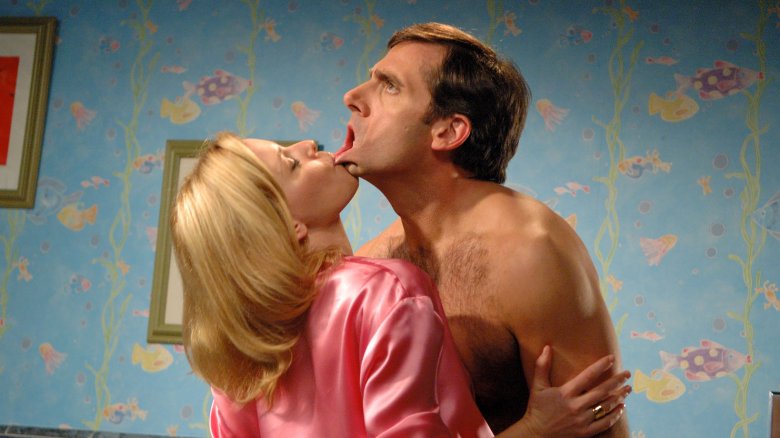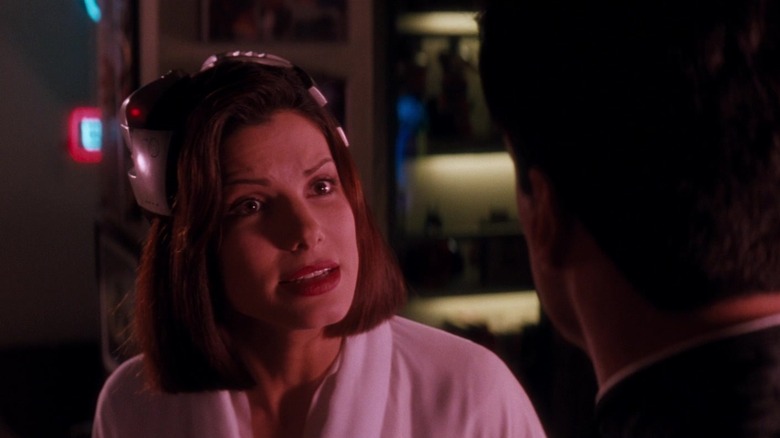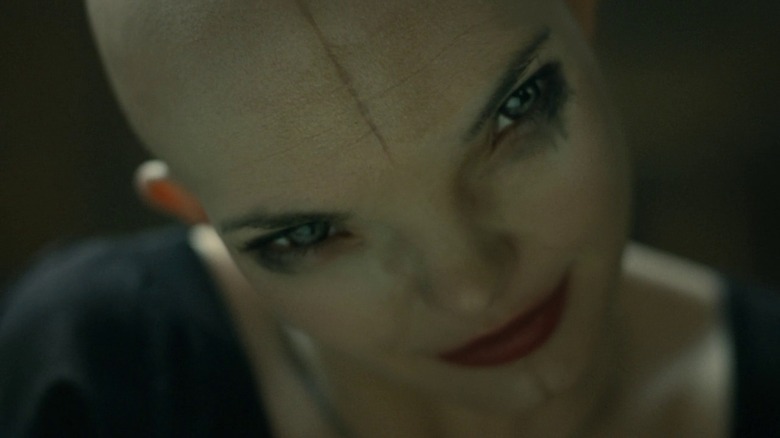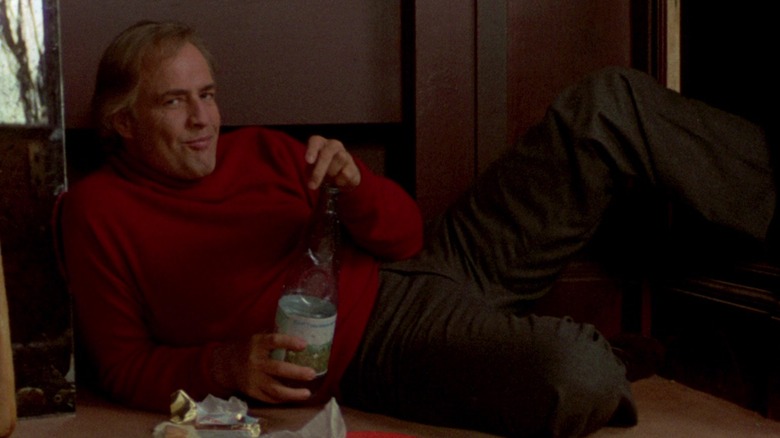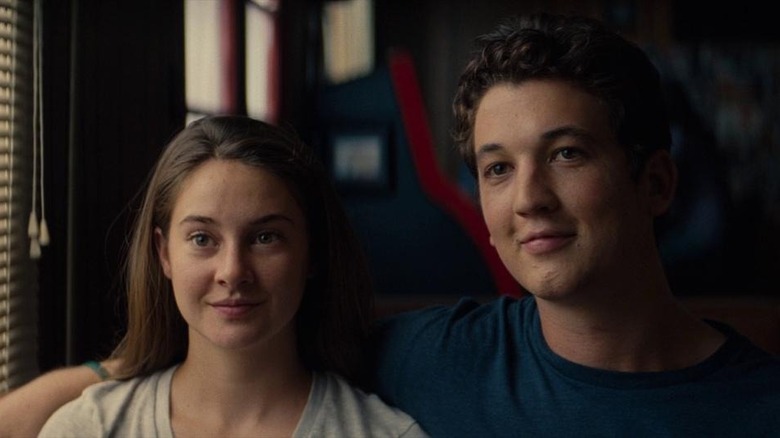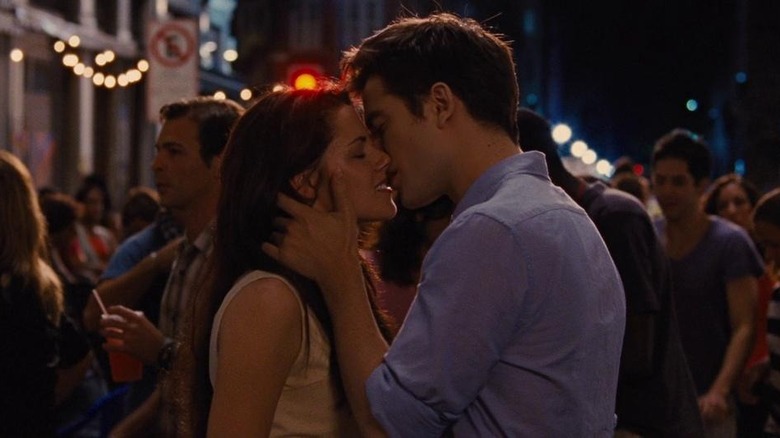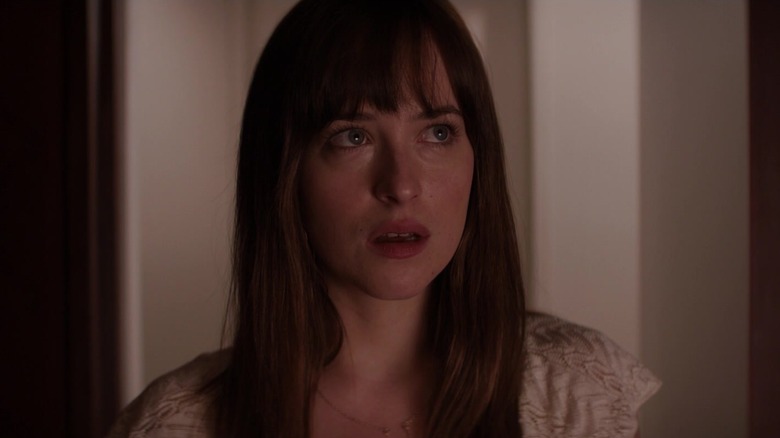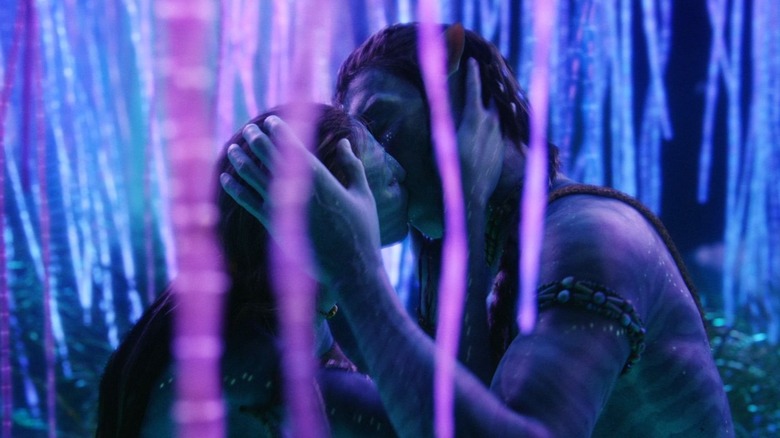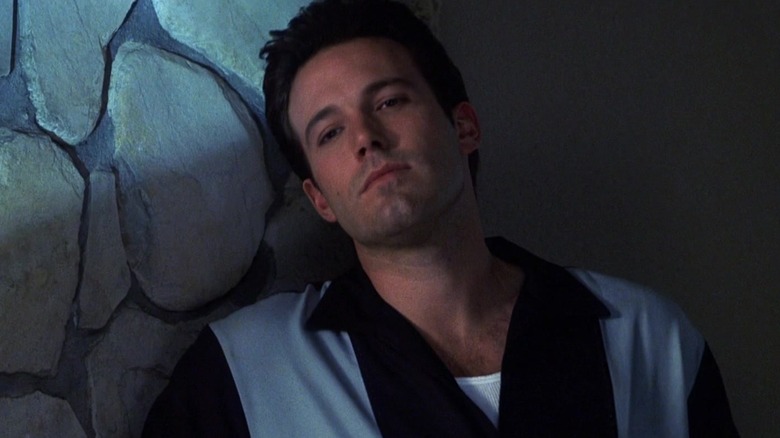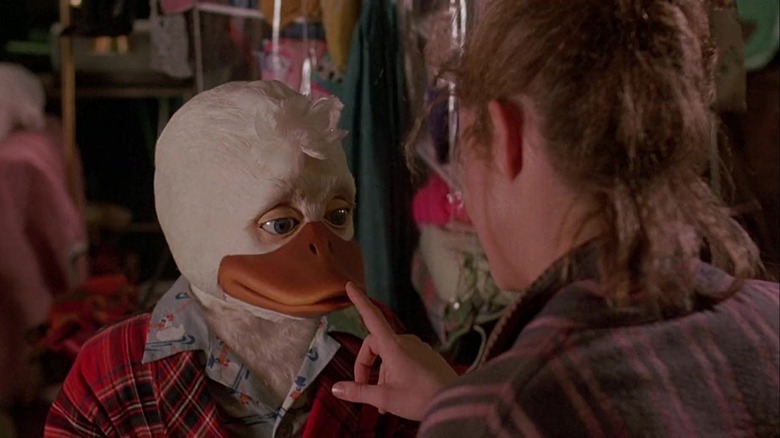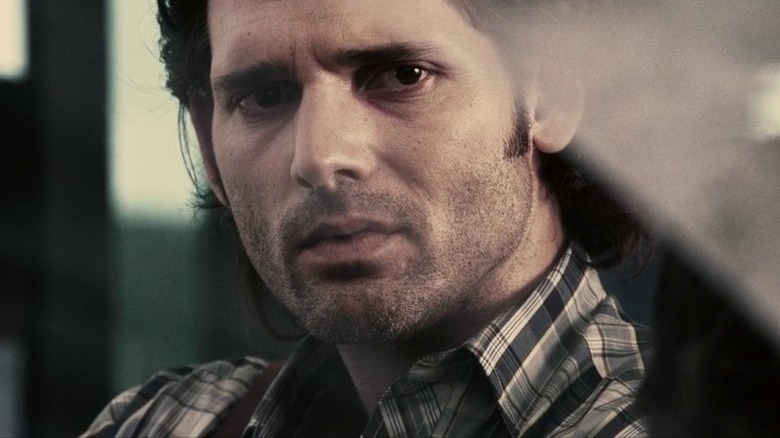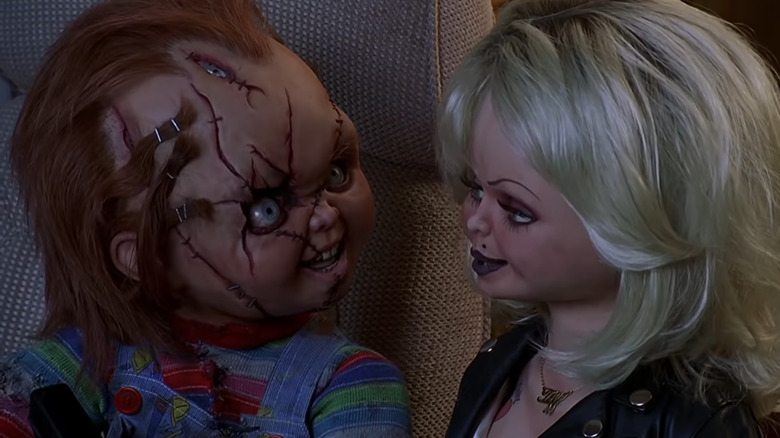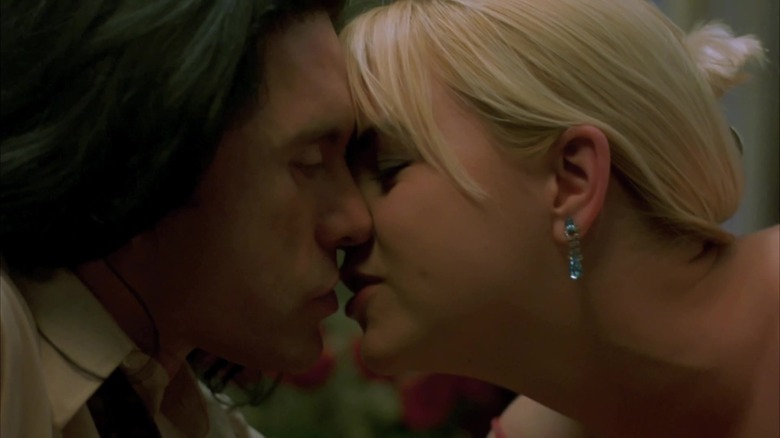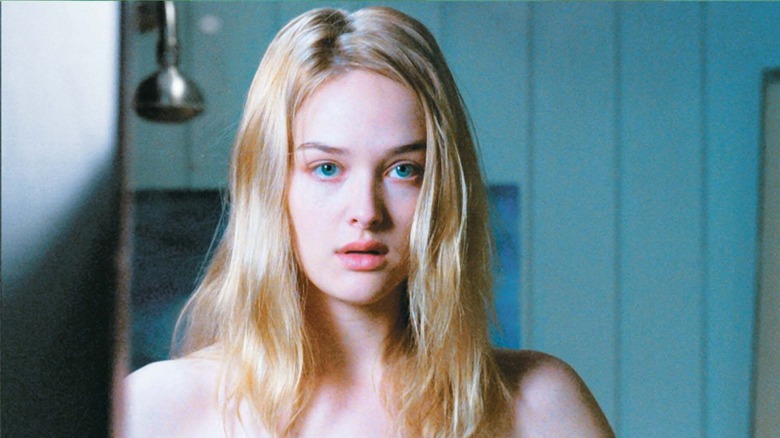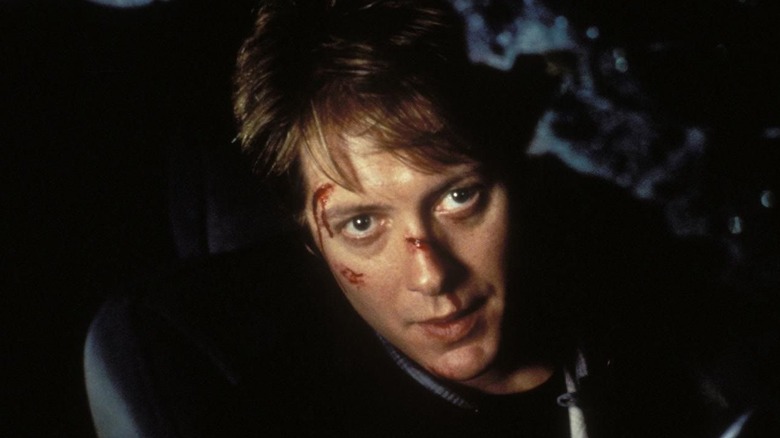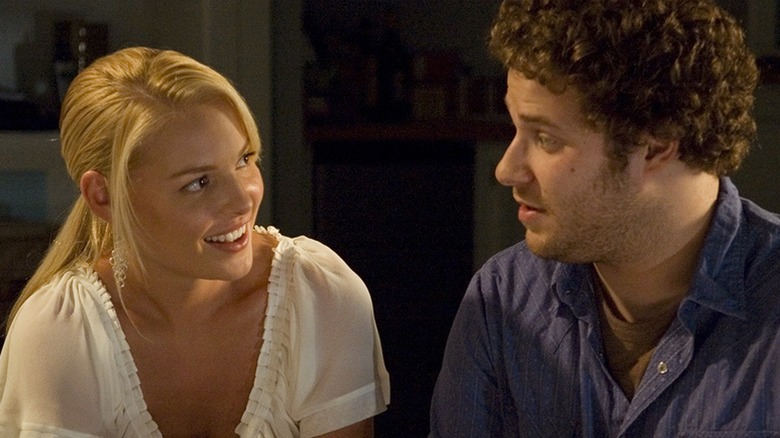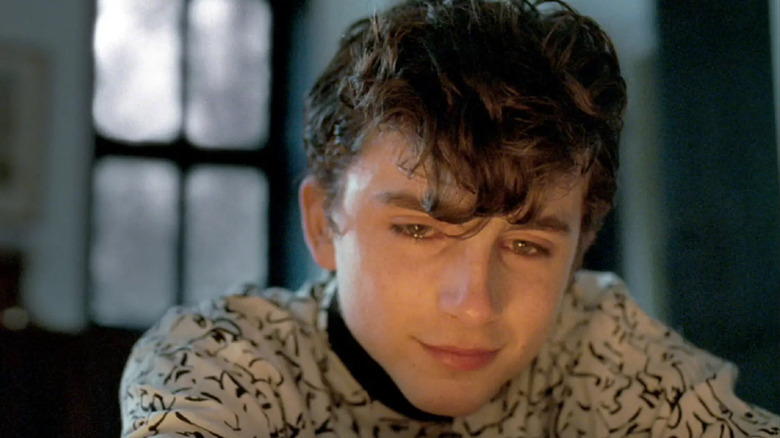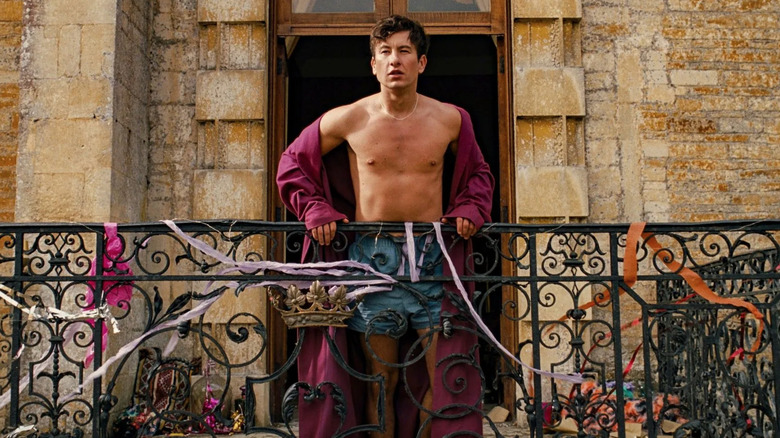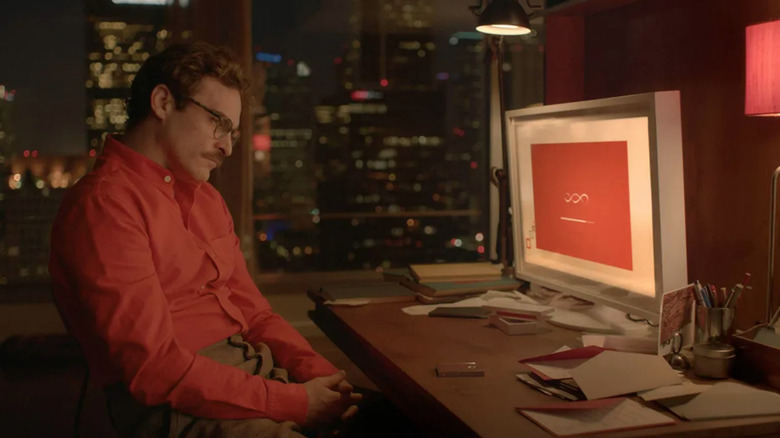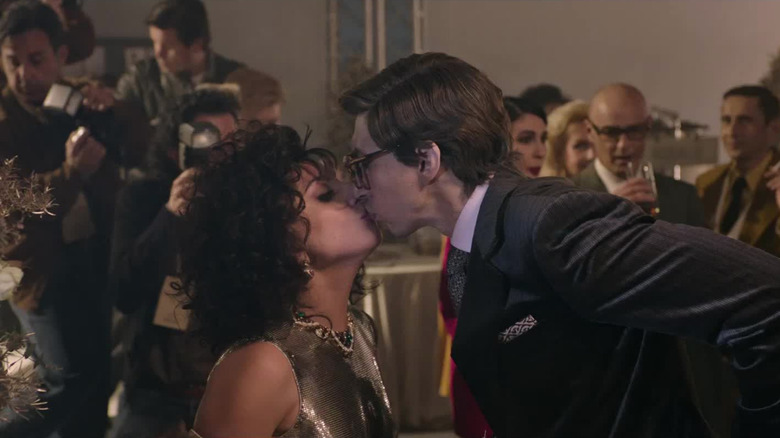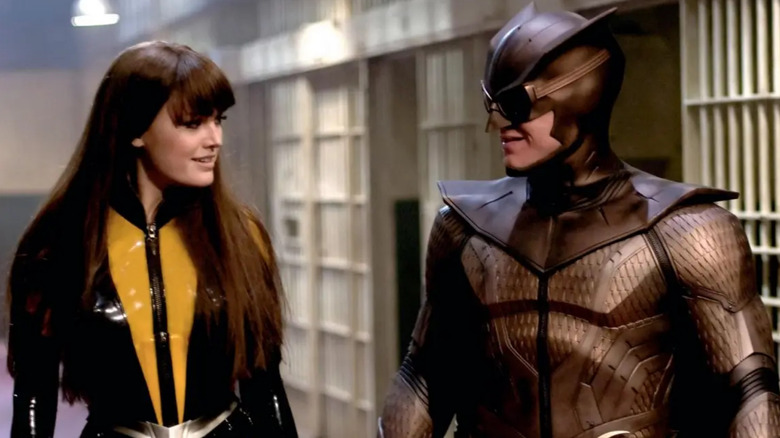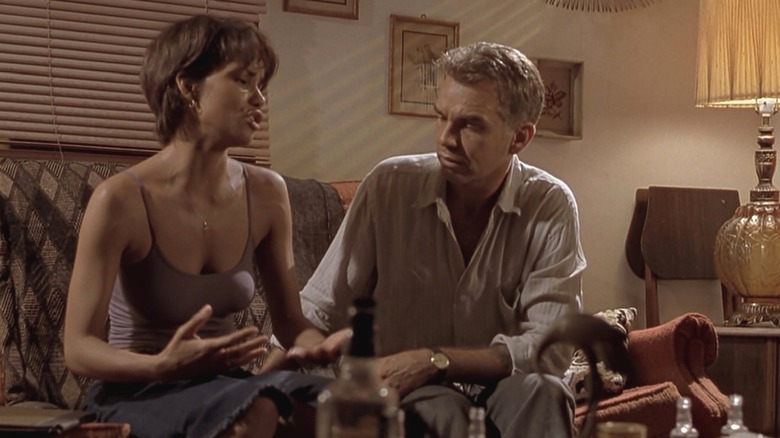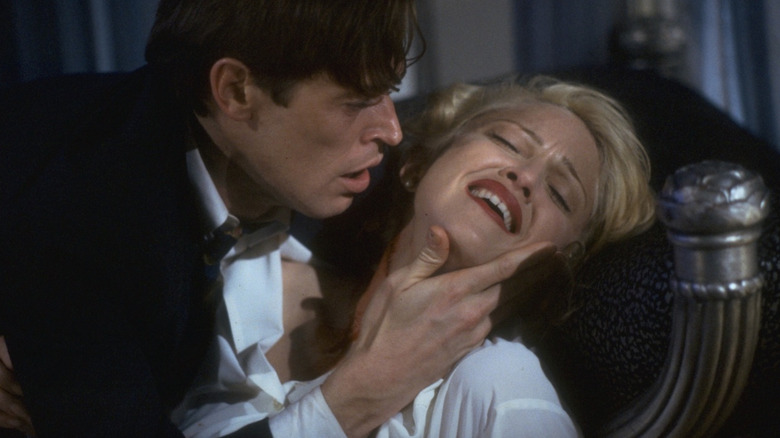The Most Awkward On-Screen Love Scenes In Movies
Going to the movies is usually meant to be a fun event for the whole family. There's a reason that movie theaters — filled with people talking during the film, overpriced food and snacks, and questionably sticky floors — have survived for so long despite all our other entertainment options. It's the kind of activity you can do at any time of day, and usually with just about anybody.
Of course, there are exceptions if a movie has some more ... grown-up material. Because let's face it: depending on who you're watching a movie with, a love scene can be awkward for a variety of reasons. Mom, Dad, and Grandma are sitting next to you? Forget it, you don't even want two characters kissing for too long, let alone full-on going at it. But some love scenes transcend even circumstantial weirdness and are so painfully awkward in and of themselves that you'd be embarrassed to watch them alone. Here's a list of love scenes that will have you begging, "Ugh, can we go back to the graphic violence, please?"
American Beauty
Despite the fact that "American Beauty" is undoubtedly a great movie full of fantastic performances, it doesn't change the fact that one of the storylines involves a dad lusting after his teenage daughter's friend. When Kevin Spacey and Mena Suvari finally have their vomit-inducing love scene (which thankfully stops short of the big moment), the tenderness of Mena's vulnerability only serves to highlight how inappropriate the whole thing was from the start.
Throughout the movie, Spacey's lustful fantasies about her are generally played for comedy, so when their real encounter finally happens, it's a very "Please tell us this is not happening right now" moment. The punctuation of the scene where he covers her with a blanket is such a post-traumatic gesture that most viewers are probably just relieved it's over. Plus, he gets murdered moments later. This scene isn't any easier to watch in a post-#MeToo world, where Kevin Spacey has been accused of and charged with multiple counts of sexual assault.
Requiem for a Dream
The uncomfortable scene in question here occurs at the end of "Requiem for a Dream," when each of the main characters are deep in the worst stages of their own personal addictions. We're literally witnessing all of them hitting their rock bottoms at the same time. Jennifer Connelly plays Marion, a heroin addict who resorts to selling her body for the drug when she is recruited into doing a "show" for a bunch of demonic, salivating men who jeer and throw money on her and another woman during the performance.
It's not so much a love scene as a horrifically graphic act that occurs amid a swirling, brilliantly edited sequence that not only weaves together the awful predicaments that each character has found themselves in but also imparts their panic and despair onto the audience through the effective if not jarring use of sheer shock value.
Observe and Report
Almost any love scene in a comedy could make this list — "MacGruber," "American Pie," "Knocked Up" — because love scenes in comedies are specifically played for awkward laughs. But "Observe and Report" isn't a standard comedy. It's dark, twisted humor from the creator of "Eastbound and Down," so when Seth Rogen finally lands his dream girl, Anna Faris, their love scene strays directly into seedy territory. They're drunk, for starters, which already means that they're not thinking straight and can't give informed consent. Nevertheless, the two of them go back to hers for sex, though Brandi (Faris) has ingested a lot of clonazepam and is only semi-conscious — but the film charges past this.
The film tries to recover the scene with a joke, as the passed-out Faris, with whom Rogen is getting it on, half-wakes up and says, "Why are you stopping?" But at that point, the creepy vibe becomes too much. That's a gross exploitation of a terrible situation. Not to mention just watching a sweaty Rogen fumble his way through lovemaking with any beautiful actress is tough to watch. It even makes you empathize with Katherine Heigl, and that's no easy task.
Showgirls
"Showgirls" came on the heels of director Paul Verhoeven's manic run of "RoboCop," "Total Recall," and "Basic Instinct," so he was probably looking for that same kind of visceral reaction when he took on the world of nude dancers in Las Vegas. Unfortunately, he produced a film that had a rocky reception at best.
Some critics cited its campy melodrama as a detractor, and if you're not on the film's wavelength, it's true that "Showgirls" may have been more at home on Lifetime if it weren't for the graphic sex, most specifically the now infamous pool scene. In it, Elizabeth Berkley writhes around on top of Kyle MacLachlan like someone just threw a toaster in next to them. If you can wipe the tears of laughter from your eyes in time, you can literally see the confusion on his face as he had to be thinking, "What is she doing?! Oh well, at least I know they'll never use this take."
But Verhoeven's reputation at least has endured beyond "Showgirls," and the film — with its wild sex scenes and supreme levels of camp — has more recently been the subject of rediscovery and reappraisal.
Gone Girl
"Gone Girl" has a few grisly scenes, but the one that takes the cake is undoubtedly the love scene that ends in the throat-slitting of Desi (Neil Patrick Harris), one of Amy's ill-fated marks in her diabolical plan to frame her husband for murder. For the sake of getting right to the matter at hand, we'll set aside some seemingly large plot holes with the scene in general — like how would she later explain her access to a razor if she was supposedly Desi's captive?
Anyway, the scene is set up for tension from the start. The lighting makes the room look like a bordello, and the score is nothing but foreboding tones that signal imminent dread rather than sexy time. And just when Desi's going to give us the always cringe-worthy moment of any love scene, we're sliced right into "OH MY GOD!" territory, and everything changes. Needless to say, Harris did not have the best time ever in this scene. But at least it was over quickly.
Kickboxing Academy
"Kickboxing Academy" has a title so hilariously '90s that it couldn't possibly be a real movie. It is, although this 1997 B-movie was also released under the far more boring (if accurate) title "Teen Boxer." The plot concerns, of course, kickboxing and the day-to-day activities at a kickboxing academy. (It's right in the title!) Ultimately, the kickboxing kids have to square off against the kickboxing kids from another martial arts school.
Among those kickboxing kids are a couple of fresh-faced teens named Cindy and Danny, played by Chyler Leigh (years before she starred in "Not Another Teen Movie" and "Grey's Anatomy") and Christopher Khayman Lee (from multiple "Power Rangers" series). Fun fact: In real life, Leigh and Lee are brother and sister. Not so fun fact: Their characters are romantically involved. And the cruel director didn't think it was at all weird to shoot and then include multiple scenes in which Cindy and Danny get their smooch on.
MacGruber
"MacGruber" began as a recurring "Saturday Night Live" bit, an obvious parody of the 1985-1992 action show "MacGyver." In that show, Richard Dean Anderson starred as a genius who could save the day by making life-saving inventions out of household materials — those being the exact words of the "MacGruber" sketch's theme song. In every installment, MacGruber (Will Forte), alongside assistants Casey (Maya Rudolph) or Vicki (Kristen Wiig), would try to get out of a locked room with a ticking bomb, using only whatever was lying around ... and he'd inevitably fail.
Forte and collaborators John Solomon and Jorma Taccone needed to flesh that out for a full-length movie, and so made "MacGruber" a parody of over-the-top '80s action movies. Amid all the explosions and lone-wolf theatrics, those films always included a steamy love scene. So does "MacGruber."
As Mr. Mister's power ballad "Broken Wings" plays, MacGruber begins to make sweet love to his wife, Casey, in her wedding gown. Then things get hilariously weird and dark. The music falls away, and viewers see a bare-buttocked MacGruber grunting away atop his white-lace-covered lady ... in a graveyard while a groundskeeper watches. But wait ... Casey died earlier in the movie, and "MacGruber" re-establishes that fact with a cut back to MacGruber, now standing nude in a graveyard at night, moaning and talking dirty as he does his thing to a ghost that no one else can see.
Kingpin
At the 2019 Academy Awards, Peter Farrelly won two Oscars for his work on the race relations drama "Green Book." Yes, the guy who made some of the grossest and most outrageous comedies of the '90s — "There's Something About Mary," "Dumb and Dumber," and "Kingpin" — owns more Oscars than Martin Scorsese. He's also made way more bowling comedies than Scorsese. Well, just the one: "Kingpin."
Former bowling champion Roy Munsen (Woody Harrelson) is down on his luck. An attempt to hustle amateur bowlers goes poorly, and he loses his hand in a ball return accident. Two decades later, he's reduced to selling bowling supplies and spends most of his time drinking. All of this leaves him extremely poor, and he has little choice but to bed down with his landlady (Lin Shaye) so she'll be more forgiving with his perpetually late rent payments.
That's the uncomfortable setup — a man who suffers from excessive alcohol use has to prostitute himself to not be homeless. There's an even more unsettling payoff. Roy stages an attack on the landlady (so as to chase the guy off and earn himself some favor), but she finds out about it, and she forces him to make it up to her in the bedroom. Cut to the landlady lying in bed smoking a cigarette in post-coital bliss while Roy throws up in the adjoining bathroom.
Oldboy
Writer-director Park Chan-wook's 2003 action drama "Oldboy" won numerous awards on the festival circuit, including the Palme d'Or at the Cannes Film Festival. It's not only one of the most acclaimed South Korean films ever made, but it also helped put South Korean cinema on the map. Amid the labyrinthine, unpredictable plot, there's a love scene in "Oldboy" that becomes disturbing in retrospect after all the mysteries have unraveled themselves.
Oh Dae-su (Choi Min-sik) gets arrested one night for public drunkenness and misses his young daughter's birthday party. After a friend retrieves him from a police station, he's kidnapped and isolated in a hotel room for 15 years. When he's finally released, he wanders into a sushi restaurant and strikes up a relationship with its young chef, Mi-do (Kang Hye-jung). He tries to get his life back together but gives up on finding his daughter when he learns she was adopted by a Swedish couple.
His captor, Lee Woo-jin (Yoo Ji-tae), soon contacts Dae-su with an ultimatum: If he guesses the reason for his imprisonment in five days, Woo-jin will kill himself; if not, he'll kill Mi-do. Dae-su and Mi-do's relationship grows increasingly intimate, but then Dae-su figures it all out. He went to high school with Woo-jin, whom he saw engage in incest with his sister. Dae-su spread the news, and the sister was so mortified that she committed suicide. Woo-jin has now had his revenge on Dae-su — first imprisoning him, then making him commit incest himself. Remember his long-lost daughter? That's Mi-do.
The 40-Year-Old Virgin
"The 40-Year-Old Virgin" consists almost entirely of one uncomfortable scene after another. It's about a bunch of boorish dudes who work at an electronics store and decide to help their nerdy colleague Andy (Steve Carell) nail down his first intimate experience. They give him a lot of ill-advised counseling, and Andy embarks on several disastrous dates, all while slowly falling sweetly in love with a single mother and small business owner named Trish (Catherine Keener).
Andy gradually prepares to take things to a physical level, but his friends push him to pick up the pace. At a club one night, he runs into Beth (Elizabeth Banks), a lady he'd previously practiced flirting with, and she takes him home. She aggressively attempts to seduce Andy, whipping him with his belt and biting him on the lip. Finally, before he can have a bad first time (and cheat on Trish), his friends show up to bail him out. That's good because the guy has been rocking a distant, traumatized stare since Beth got him into her bedroom.
Demolition Man
The 1993 sci-fi satire "Demolition Man" had an ambitious and bizarre view of what "the future" would be like. Sylvester Stallone plays John Spartan, a cop from the '90s, cryogenically frozen until 2032 when he's thawed out to hunt a master criminal (Wesley Snipes). Spartan wakes to a world he finds bizarre and confusing. For example, the only restaurant is Taco Bell, toilet paper has been replaced by shells, and the thing that people do behind closed doors is conducted with virtual reality helmets.
Yes, viewers get a glimpse of future love, but that can only happen after John's guide, San Angeles (because L.A. and San Diego have merged in the future) police lieutenant Lenina Huxley (Sandra Bullock) initiates the act in the most overly verbose and technically worded seduction in movie history. Nothing gets a guy interested like the phrase "general state of neurological arousal."
As one of the least romantic songs ever made — the theme from "The Love Boat" — plays, Lenina emerges from her bedroom, dressed in a robe and brandishing two skull-clamping VR helmets. Lenina closes her eyes, starts breathing heavily, and then the experience kicks in for John. Apparently "making love" in the future consists of a series of rapid-fire, split-second, multicolored images of one's partner. It's all so much that John "breaks contact" and rips his helmet off.
Splice
The 2009 science fiction/horror movie "Splice" raises a lot of questions about the moral implications and personal ramifications of science, particularly the rapidly evolving discipline of genetic engineering. While working at a scientific facility called Nucleic Exchange Research and Development (or N.E.R.D.), genetic engineers Clive (Adrien Brody) and Elsa (Sarah Polley) secretly develop a viable creature, mixing human DNA with genetic materials from animals.
The being that results grows from child to young woman very quickly, and Elsa names her Dren (N.E.R.D. backward). Clive, meanwhile, clearly finds Dren (Delphine Chanéac) beautiful, although she's more animal than human with her giant eyes, long tail, and feet that look like hands. It's obvious the movie is going to build to some kind of intimate act between Clive and Dren, but it doesn't make it any less weird when it happens. And it does happen, in a barn where Dren has been locked up, no less. It's like he's getting down with his coworker and his pet all at once.
Last Tango in Paris
Most movie love scenes feature actors awkwardly playing pretend, but in 1972's "Last Tango in Paris," what audiences witnessed was more of a filmed assault. The movie stars Marlon Brando as Paul, an American widower who begins a clandestine sexual relationship with a French woman named Jeanne, whom he meets frequently in an empty apartment he is renting. This sex-laden drama boasts an infamous scene where Paul uses a stick of butter as lubricant before brutally having his way with Jeanne.
As you might have guessed, Schneider didn't sign up for this. Sure, the scene was in the script, but the addition of butter was a last-minute idea suggested by Brando to director Bernardo Bertolucci, who thought it was a nice touch to add to the character's degradation. In 2007, Schneider said that filming the scene made her feel "humiliated" and "a little raped, both by Marlon and by Bertolucci."
The Spectacular Now
With Miles Teller at his Miles Teller-est and Shailene Woodley at her perfect everygirl-ness, "The Spectacular Now" is generally regarded as about as sincere as a teen love story gets. It tells the story of Sutter and Aimee, two troubled teens who fall deeply in love but must deal with their families and own personal foibles — especially Sutter's drinking — before they can attempt a future together.
The problem was that the filmmakers took that sincerity right into the bedroom for the pair's first time — and never before has four minutes of cinema felt like such an eternity. The giggling, the nervousness, the physicality of the scene — everything is so innocent and real that it makes you feel like you shouldn't be witnessing such a personal moment. Don't get us wrong, it's a totally sweet and endearing film, and you'll probably cry and laugh at this movie. But ask yourself this: if you could go back and watch your first time, would you?
The Twilight Saga: Breaking Dawn -- Part 1
One of the benefits of a book over a movie is that the responsibility of bringing magical scenes to life is placed on the reader. Authors can describe things with as much detail as they like, but even if they just convey a feeling or a sensibility, it's mission accomplished. A filmmaker, on the other hand, has to actually show things in a realistic way, and the actors have to convincingly portray a scene that just might not be realistic for their characters or, you know, reality.
For "The Twilight Saga: Breaking Dawn — Part 1," the filmmakers ran into trouble with the long-awaited moment of sexual congress between the so-in-love-it-hurts Bella (human girl) and Edward (vampire boy). Kristen Stewart, as Bella, realized it was a foolhardy mission. As laid out in Stephenie Meyer's "Breaking Dawn" novel, the sex scene "had to be transcendent and otherworldly, inhuman, better sex than you can possibly ever imagine," causing an understandably frustrated Stewart to ask, "How do we live up to that?" As a result, the actress describes filming the scene with Robert Pattinson as "agony," even though he was her real-life boyfriend at the time.
Fifty Shades of Grey
Few films have received the level of critical derision and simultaneous fan acclaim accorded to "Fifty Shades of Grey." That's because the only people who like the movie are also fans of the laughable novels. Their publisher put sentences like "Hmm ... My inner goddess is doing the merengue with some salsa moves" into print and asked people to pay money for it. So it's no surprise that the film's director created the same corny, heavy-handed, implausible romance that sees Anastasia (Dakota Johnson), the mousy virgin, transformed into a kinky submissive at the hands of Christian (Jamie Dornan), a man who would definitely be considered a creepy predator if he weren't a billionaire.
Each love scene escalates further into ridiculousness to the point where the climax of the film occurs when Anastasia freaks out after Christian spanks her too hard. This happens in his "play room," which looks like it was teleported from the Tower of London and features hooks, whips, chains, and all other manners of medieval-looking torture devices that Anastasia seemingly has no issue with. But seriously, Christian, take it easy on the spanking, would ya?
Avatar
James Cameron's CG world of "Avatar" was so different, so alien, that even the act of physical intimacy was something to behold. Of course, that doesn't take into consideration whether or not it was something anyone actually wanted to behold. Here's the main thing: On the planet Pandora, making love is basically just plug and play. Thanks to his Na'vi avatar, human Marine Jake Sully (Sam Worthington) can get busy with actual Na'vi female Neytiri (Zoe Saldana). Of course, that means connecting the tendrils on the ends of their braids to fully experience one another in the most intimate of ways. And let's not forget, this all goes down in a purple jellyfish forest.
That's not the worst part about all this. No, the worst part is that audiences were so enamored with the planet of Pandora and all the Na'vi's ponytail-linking love that many people actually reported feeling depressed that they couldn't live in the world of "Avatar" in real life.
Gigli
Just in case you hadn't already heard or experienced firsthand how awful "Gigli" is, here's another piece of info to solidify the film's already soiled reputation: Martin Brest, the director famous for "Beverly Hills Cop," "Scent of a Woman," and "Meet Joe Black," never made another film after "Gigli."
Now, onto the dreadful love scenes. The studio reportedly forced Brest to turn what originally was a mob movie into a rom-com to "cash in on the relationship between Ben Affleck and Jennifer Lopez." So our only explanation for the resulting love scenes has to be that they were a vindictive parting shot by a director already set on leaving the business. We imagine his direction was something like, "Show the world exactly what it's like in Bennifer's real bedroom." Then he probably went back to his trailer and drank until he passed out while Ben Affleck delivered a nauseatingly realistic depiction of the faces he makes in the throes of passion. Only your partners, the bedroom ceiling, and maybe Matt Damon should have ever seen that, Ben. Yuck.
Howard the Duck
"Howard the Duck" is a lot of things. It's the first movie based on a Marvel Comics-created character since "Captain America" thrilled kids with a black-and-white serial in 1944. It's also the first bomb of George Lucas' career. And it's the only movie, or at least the only mainstream American comedy, to feature a tender embrace between a female rock star (Lea Thompson) and a man-sized, anthropomorphic duck (voiced by Chip Zein).
Really, we don't need to hear about Howard's new fondness for the "human version of the female anatomy" or how Thompson just can't resist Howard's "intense, animal magnetism." Of course, since this 1986 flick is one of the lowest-grossing movies in Marvel history (and was made long before the MCU started producing monster hits like "Iron Man" and "Avengers: Endgame"), it's probably safe to say we won't see any human-duck love scenes in the future.
Munich
Love scenes can go in all kinds of movies — not just romantic comedies. Sometimes, a super serious drama or even a fun and action-filled romp can be spiced up with a cinematic roll in the hay, right? In general, most audiences are down for some kind of romantic interlude in a movie just to break the tension. Then again, just because a movie can have a love scene doesn't mean it should.
Case in point: You know what a movie about Israeli assassins sent to avenge the deaths of athletes who were brutally murdered by terrorists at the 1972 Summer Olympics doesn't need? A love scene. After spending a very long time hunting down terrorists, Avner (Eric Bana) has sex with his wife (Ayelet Zurer), and the action cuts between scenes of their wild ecstasy and violent images of people being gunned down at an airport. True, director Steven Spielberg was probably just trying to be both artful and cathartic with the scene — after all, intercutting sex and violence isn't anything new — but that doesn't make it any less uncomfortable.
Bride of Chucky
After three movies about an evil stuffed doll possessed by the soul of a serial killer, the filmmakers behind "Child's Play" needed to expand their universe, and so they decided to have Chucky take a lover. "Bride of Chucky" in 1998 finds Chucky (Brad Dourif) reconnecting with Tiffany (Jennifer Tilly), his girlfriend from his human serial killer days, and after he kills her, he puts her in the body of a bride doll that looks like the blond, female version of himself.
A bloody crime spree from these two psychopaths follows, and that isn't exactly a good environment for a love scene, which, no matter what was going to be strange and uncomfortable because it involves the most intimate acts of grotesque monster dolls rendered with the best technology and puppetry a low-budget '90s movie had to offer. After Chucky proposes marriage, amorous feelings take over. There's a lot of loud open-mouth kissing from two characters whose mouths don't really move, stripping off clothes in front of a roaring fire, and then Chucky and Tiffany doing the deed in a silhouette that leaves little to the imagination. Making things worse are the mid-act wisecracks. "Have you got a rubber?" Tiffany asks. "Tiff," Chucky responds, "I'm all rubber!"
The Room
"The Room" became a cult classic because it's legitimately among the worst movies ever made. Starring, written by, and directed by a man with no filmmaking background named Tommy Wiseau, "The Room" is delightfully abysmal. Amid one atrocity after another is a flurry of love scenes — well, really just one love scene that we see four times — between the troubled lovers at the center of one of the film's many vague plot lines. Providing respite from all the emotional agony in his life, Johnny (Wiseau) and Lisa (Juliette Danielle) hit the bedroom for a scene seemingly inspired by the kind of nudity-heavy low-budget erotica that aired on Cinemax in the '80s and '90s.
Shot through gauzy white curtains, then a rainy window, and lit by both candles and abrasive bright neon light, Johnny is positively obsessed with a single red rose, ostensibly a symbol of romance. After Lisa slaps him with the flower and they get more into the moment, Johnny clumsily plucks off every petal and throws them at Lisa. All this odd foreplay leads up to the big moment, and the couple doesn't seem to be anywhere close to aligned with each other. And then it just keeps going on, for way too long, until Johnny apparently falls asleep and Lisa turns off the light — errant rose petals still stuck to her back.
Teeth
According to University College London researchers, there's an old folktale about women with vagina dentata, or a second set of very sharp teeth in an intimate area. It's not a real medical condition and probably stems from men's fear and lack of understanding of female sexuality hundreds of years ago (and today). The 2007 low-budget horror comedy "Teeth" took this old legend (and the sexual politics that inspired it) as the basis for its story, an allegory about adolescence and the physical changes that it brings.
Dawn (Jess Weixler) hasn't explored much in the ways of carnality, what with how she's very involved in her high school's chastity club. But then she meets a boy she likes, and things are going well with Tobey (Hale Appleman) until he suddenly turns aggressive, impatient, and violent. What starts as a love scene sickeningly turns into an assault scene. Dawn fights off Tobey, he gets mad and shakes her, and she hits her head and goes unconscious.
When she awakes, it's mid-assault — but Dawn puts an end to it and gets the upper hand thanks to her heretofore undiscovered physical quirk. In other words, her second pair of teeth have a mind of their own, and they defend against the attacker with a quick and effective bite that severs Tobey from his manhood.
Crash
David Cronenberg's films are always delightfully provocative, transgressive, and bewildering. He's famous for his body horror films — like "The Fly" and "Videodrome" — as well as his psychological thrillers. In 1996 he adapted for the screen and directed "Crash," an NC-17-rated take on the dark and edgy novel of the same name by J.G. Ballard.
This is a movie that's all about sex, particularly its more obscure, less mainstream, fetishistic, and potentially discomforting manifestations. James Spader plays a man who, after getting into a near-fatal car accident, finds out about a group of people who derive pleasure from vehicular mishaps, channeling the fear, anxiety, and rushes they cause into erotic energy. That means "Crash" includes plenty of love scenes that are also violent car accident scenes. Crashes cause injuries, and for the character, played by Rosanna Arquette, that's a big, bloody wound on her leg. Spader's character then treats it as he would any other naturally occurring bodily orifice on a partner.
Knocked Up
Seth Rogen's done a lot of cringey sex scenes. Between "Knocked Up" and "Observe and Report," it's hard to choose a more uncomfortable one, but Judd Apatow's 2007 comedy may just take the cake. In the film, Ben (Rogen) is an immature, irresponsible guy forced to quickly become an adult when Alison (Katherine Heigl), the woman with whom he had a one-night stand, learns she's pregnant. Alison decides to carry the child to term and requests that Ben come into her life as a partner. They bicker throughout the movie, particularly over whiny and lazy Ben's inability and unwillingness to change, but they still decide to make a go of a more permanent romantic situation.
You'd think the initial clumsy, drunk lovemaking scene between the two of them would be the most uncomfortable one in the film. But no — after they're back together, Ben and Alison find themselves in the middle of another baby-making act, except Alison is already very far into her pregnancy at that point. This is a fact that Ben can't stop obsessing over. Rather than be in the moment in any way, he keeps acting like he's acted the whole movie — annoyingly immature. The physical act is a disaster because Ben is worried he's going to "poke" the growing fetus, something that's physically impossible and a myth that's dispelled on day one of junior high health class.
Call Me By Your Name
"Dune" and "Wonka" actor Timothée Chalamet gained peachy notoriety for one particular scene in the 2017 romantic drama "Call Me By Your Name." In the film, Chalamet's character, Elio, and his love interest, Oliver (Armie Hammer), share a passionate summer romance. This culminates in an infamous scene where Elio takes out his complicated feelings on an innocent, unassuming peach. Is it completely shocking and tenderly intimate at the same time? Absolutely. Could he have chosen a less sticky piece of food to pleasure himself with? Perhaps.
To make matters worse, Oliver teases Elio by nearly eating the defiled peach. Fortunately for the viewers, he doesn't. However, readers of the novel, upon which the film is based, are met with a much more graphic fate. The novel's author, André Aciman, put the scene into perspective best in an interview with TIFF, saying, "It takes a physical, almost lusty moment and finds its emotional equivalent right away." And for that thoughtful, thematic approach, we forgive this painfully awkward love scene for causing such discomfort.
Saltburn
If you've yet to see "Saltburn" by now, you've surely heard about the grave scene at the very least. In the scene, Barry Keoghan's character Oliver visits his friend Felix's (Jacob Elordi) freshly dug grave, and in a moment of emotions running high, he strips down and violates the gravesite with an act of self-pleasuring. But is it really done with a sense of pleasure? Considering everything that has led to this moment, we're not so sure.
The only thing more shocking than this scene is the fact that it's only one of many in the film that take viewers to the edge of discomfort. Earlier, there's another intimate scene between Oliver and Venetia (Alison Oliver) in which Venetia's time of the month doesn't stop Oliver from going in. As graphic and awkward as it is, those who have witnessed the grave scene know it doesn't even begin to compare to the unsettling nature of Oliver getting down and dirty in the soil.
The cherry on top is knowing the scene was completely improvised by Keoghan. "I wanted to see what Oliver would do next. I wanted to see what the next level of obsession was," he told Deadline. So the question is, do we feel better knowing Emerald Fennell didn't write that in the script, or worse, knowing Keoghan came up with it on the spot?
Her
While timely and poignant in its themes of loneliness and humanity, Spike Jonze's 2013 dystopian romantic drama "Her" is a strange film at its core that'll make you squirm, laugh, and think deeply about what it means to love or be alive. Following the developing relationship between divorcee Theodore (Joaquin Phoenix) and his programmed artificial intelligence Samantha (Scarlett Johansson), "Her" pushes viewers' comfort levels with an unfamiliar intimacy that doesn't seem too far off from where we're headed in the future.
In one scene, Theodore participates in phone sex with a stranger who goes by the screen name Sexy Kitten (Kristen Wiig). It begins as a standard steamy back-and-forth, but things take an awkward turn when Sexy Kitten demands to be choked by an imaginary dead cat. The unexpected escalation is both humorous and unsettling to the point where all you can do is laugh through the unease. Really, who can blame Theodore for lusting after a computer after that traumatic experience?
House of Gucci
Ridley Scott's "House of Gucci" is a stylistically grandiose melodrama of crime and passion following the turbulent romance between Patrizia Reggiani (Lady Gaga) and Maurizio Gucci (Adam Driver). Naturally, one would expect to encounter a few love scenes sprinkled in, but maybe not as lengthy and intense as the one featured so early on in the film. Between all of the slamming into furniture and (improvised) feral animal noises, it's a pretty jarring encounter that left many viewers cringing and avoiding eye contact with the screen, waiting for it all to be over.
An opinion piece on the scene for TheGamer declared, "I didn't need Lady Gaga grunting in my face while she slams her head off the table to tell me their relationship was passionate, that much was already clear." Then there's an X fan account dedicated to Gaga, which shared a video of someone skipping the scene while watching the movie on a plane, accompanied by the caption, "Lady Gaga's House of Gucci is now on airplanes, and it's not awkward at all." So, yeah, if it wasn't already obvious enough, you may want to avoid watching this one and many others on this list in public spaces.
Watchmen
Zack Snyder's "Watchmen" is one of the few R-rated superhero movies that takes full advantage of its rating, making the movie much darker in tone and graphic in nature compared to your typical superhero movie experience. While the reception to the film was and continues to be divisive, one thing many viewers can agree on is how poorly the love scene between Nite Owl (Patrick Wilson) and Silk Spectre (Malin Åkerman) was handled.
Considering the same love scene can be found within the comics, it's both disappointing and impressive how Snyder was able to completely butcher what was originally a genuine moment between two beloved characters. The whole uncomfortable sequence, accompanied by the tonally mismatched cover of the Leonard Cohen song "Hallelujah," feels out of place and unnecessary as the camera lingers on certain parts of their bodies for far too long. To put it nicely, it feels more like perverted fan service than anything else.
Monster's Ball
In 2002, Halle Berry became the first Black woman to win the Oscar for Best Actress for her performance in the film "Monster's Ball," and while some naysayers had their reservations about the film's problematic racial dynamics and graphic sexual nature, that didn't stop Berry from taking on and embracing the role. "I thought, 'If this ends my career like many people thought it would,' I thought, 'Well, I'm going to end my own career on my own volition,'" Berry explained to Vanity Fair.
However, as impactful as "Monster's Ball" was, its harrowing subject matter only made the explicit love scene between Berry's character Leticia and Hank (Billy Bob Thorton) — an ex-prison deputy warden who, unknown to Leticia, was responsible for executing her convicted husband — all the more troublesome and unsettling to witness. In many ways, the film became defined by this scene, with it being one of the most controversial aspects of the movie. Awkward love scene or not, "Monster's Ball" is undoubtedly a difficult and heavy watch.
Body of Evidence
Commonly regarded as a vanity project for Madonna, Uli Edel's erotic thriller "Body Evidence" is an all-around uncomfortable and cringe-inducing viewing experience, even when considering its genre. And no, you are absolutely not a prude for feeling uneasy about the multiple awkward sex scenes throughout the movie. The worst one, however, comes early on in the film when Madonna's femme fatale character, Rebecca, first hooks up with married lawyer Frank (Willem Dafoe) in a sadomasochistic sexual encounter that involves Rebecca pouring hot wax and champagne on her sexual partner. It's a truly unpleasant watch made worse if you're viewing the film with any other human being.
But don't be too quick to feel bad for a consenting Frank supposedly being taken advantage of by a sexually charged mastermind. Later in the movie, he sexually assaults Rebecca in an even more horrific scene that makes the likes of "Basic Instinct" feel like a light, casual pick for movie night. Really, the box office numbers and critical reviews speak for themselves.
If you or anyone you know needs help with addiction issues, or has been a victim of sexual assault, contact the relevant resources below:
- Visit the Substance Abuse and Mental Health Services Administration website or contact SAMHSA's National Helpline at 1-800-662-HELP (4357).
- Visit the Rape, Abuse & Incest National Network website or contact RAINN's National Helpline at 1-800-656-HOPE (4673).
